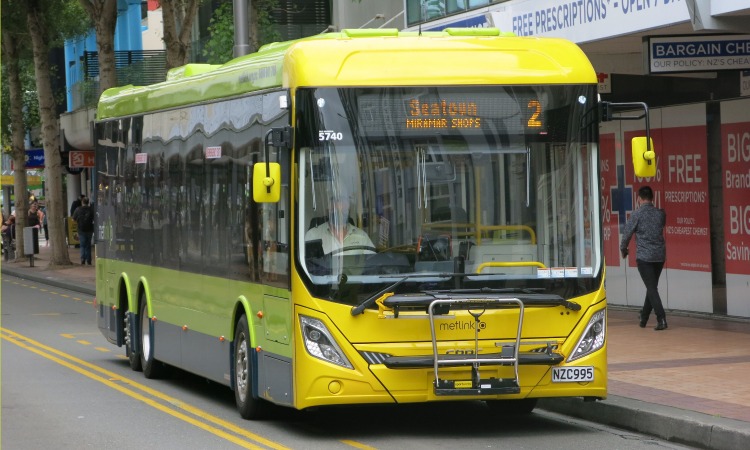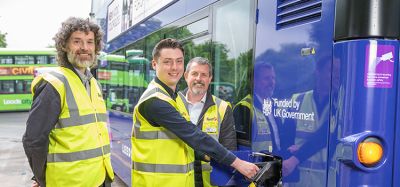Wellington’s air quality improves as Metlink’s electric bus numbers increase
- Like
- Digg
- Del
- Tumblr
- VKontakte
- Buffer
- Love This
- Odnoklassniki
- Meneame
- Blogger
- Amazon
- Yahoo Mail
- Gmail
- AOL
- Newsvine
- HackerNews
- Evernote
- MySpace
- Mail.ru
- Viadeo
- Line
- Comments
- Yummly
- SMS
- Viber
- Telegram
- Subscribe
- Skype
- Facebook Messenger
- Kakao
- LiveJournal
- Yammer
- Edgar
- Fintel
- Mix
- Instapaper
- Copy Link
Posted: 26 October 2022 | Intelligent Transport | No comments yet
A new report highlights the health benefits of Greater Wellington’s investment in electric buses, as an increase in the zero-emission vehicles has been associated with a reduction in harmful pollutants in the city.


Credit: Metlink
Greater Wellington Regional Council has announced that a new report from the region’s Environmental Science team highlights the positive impact Metlink’s electric vehicle (EV) buses are having on Wellington’s air quality along the Golden Mile, leading both to positive health benefits and climate change mitigation.
The Metlink bus fleet emissions 2021/22 Environmental Impacts Annual Report outlines air monitoring and bus emissions tracking tool results up to 30 June 2022 and reports on monthly emissions and annual air quality performance indicators.
“The report shows that greenhouse gases and air pollution from Metlink’s public bus network have trended down since September 2021, as the proportion of kilometres travelled by electric buses increased relative to diesel services,” said Senior Environmental Scientist Tamsin Mitchell.
An increase in the proportion of electric buses travelling on Manners Street, for example, has been associated with reductions in pollutants, with diesel particulate air pollution reduced by 28 per cent and nitrogen dioxide (NO2) by 18 per cent.
“Lower total emissions from the Metlink bus fleet are very welcome, and the health benefits of Greater Wellington’s investment in EV buses are clear from a corresponding decrease in harmful emissions, including particulate matter,” said Mitchell.
Nitrogen dioxide causes respiratory and cardiovascular system damage – making people more prone to infections and diseases such as asthma.
The latest Health and Air Pollution in New Zealand study, 2016, found that such problems worsened by air pollution contributed to 162 early deaths, 667 hospitalisations for respiratory and heart conditions, as well as 1,183 childhood asthma cases in the Wellington region.
Metlink General Manager Samantha Gain said: “Metlink’s bus fleet currently makes up around 35 per cent of Greater Wellington’s corporate carbon footprint, so electrification of the bus fleet will contribute to meeting Greater Wellington’s target of becoming carbon neutral by 2030. Our target is for all core service bus routes to be electric-only by 2030 and we’re working towards complete decarbonisation of the bus fleet by 2035. We currently have 90 EV buses – or 20 per cent of our fleet – and plan to have 108 by 2023, which will further boost proportion of the EV buses in the fleet to 22 per cent, which is high by international standards.”
The transport company’s electrification plans include regional initiatives such as Let’s Get Wellington Moving, intensification of urban development and the Wellington Rail Programme Business Case, a 30-year customer-driven strategic investment plan. The business case outlines what’s needed beyond current investment to help drive the region’s economic development and social wellbeing in an environmentally and socially sustainable manner.
If you liked this, you may also be interested in:
▶ Melbourne’s Zero Emissions Bus Trial advances with launch of first electric buses
Related topics
Air Quality, Alternative Power, Fleet Management & Maintenance, Passenger Experience, Public Transport, Sustainable Urban Transport
Related modes
Bus & Coach
Related cities
Wellington
Related countries
New Zealand
Related organisations
Greater Wellington Regional Council, Metlink
Related people
Samantha Gain, Tamsin Mitchell







